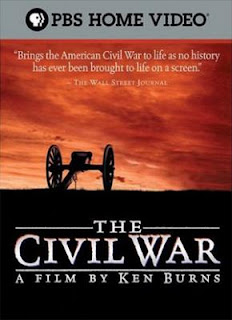The Civil War
 It was twenty years ago this month that Ken Burns' documentary The Civil War debuted on PBS. It was received with almost universal acclaim, and to this day remains one of the most monumental achievements in television history. Every once in a while, usually during pledge drives, PBS stations will run it again, and I'll tune in for a while. But I hadn't seen it all the way through since it first aired, so I picked up a used copy from Amazon and recently did just that.
It was twenty years ago this month that Ken Burns' documentary The Civil War debuted on PBS. It was received with almost universal acclaim, and to this day remains one of the most monumental achievements in television history. Every once in a while, usually during pledge drives, PBS stations will run it again, and I'll tune in for a while. But I hadn't seen it all the way through since it first aired, so I picked up a used copy from Amazon and recently did just that.It's hard to reinforce just how great this film is. Burns has taken a subject so huge--more than one of his experts says the Civil War was the defining event in American history--and manages to be so comprehensive, touching on all the major battles, the presidencies of Lincoln and Davis, the personalities of the generals, and what life was like for both the common soldiers and the civilians. I know there have been a few quibbles--the campaign in the far west in goes almost completely unmentioned, some think Joshua Chamberlain of Maine was inordinately praised, and Burns takes the stance, rightly in my opinion, that the war was above all about slavery--but one can't ignore the majesty and breathtaking scope of his canvas.
The Burns touch has come to be well-known and parodied. His technique of panning slowly across still photographs has come to be known as "the Burns Effect" in editing software. But it's so superior to the use of actor re-enactments, which are common on the more shoddily produced documentaries common to the History Channel. He also made great use of music. The sound of "Battle Cry of Freedom" being played slowly on piano never failed to move me, and then there's the theme music, "Ashokan Farewell," composed by Jay Ungar. Ironically, it's the only music in the film that is not period, but it's haunting melody is a perfect accompaniment to the subject at hand.
Then there is the narration, by historian David McCullough. He's not an actor, but his crisp delivery made him the perfect choice. The other voices: Sam Waterston as Lincoln, Garrison Keillor as Walt Whitman, George Plimpton's plummy voice as New York Wall Street man George Templeton Strong, and the sorrowful cadence of George Black as Robert E. Lee, all perfect. And, of course, the film briefly made a star of Shelby Foote, whose folksy wisdom was as endearing as it was informative. It's hard to pick my favorite moment of his, but it might have been when he told Nathan Bedford Forrest's granddaughter that he thought the war produced two true geniuses: Abraham Lincoln and her grandfather. She paused and said, "You know we don't think too much of Mr. Lincoln down here."
Burns' greatest achievement was making the film play as a narrative, much like Foote's three-volume magnum opus. The principles are characters in a story. His use of the diaries of foot soldiers on both sides--Elisha Hunt Rhodes of Rhode Island and Sam Watkins of Tennessee, are great counter-balances to the stories of the generals. And it plays like a suspenseful movie. Will the Union overcome the incompetence of their early commanders (George McClellan comes off badly, as usual) and manage to beat the geniuses Stonewall Jackson and Robert E. Lee? At times I doubted it, even though I knew better. The second half of the film, as with the war, then focuses on Ulysses Grant and William Sherman, who were generals in a modern sense, waging total war on the countryside. "War is all hell," Sherman said.
It all comes back to slavery. Perhaps the most trenchant comment comes from historian Barbara Fields, who says that the single event that caused the war was the founders drafting a constitution that permitted slavery. On the penumbra of this film is the experience of southern blacks, who are freed in 1863, and their northern brethren, who ultimately don the uniform of the Union and fight admirably.
Also moving are the film clips that Burns uses to frame his 608-minute film--the footage of reunions of the Gettysburg veterans, including one in 1938, the 75th anniversary of the battle. The old vets meet again at the Angle, where they once met after Pickett's Charge, but now, white-bearded, hard of hearing, and stooped of shoulder, they shook hands in brotherhood. As the film says, the Civil War defined what America was. We were born after the Revolution, but it took a civil war to decide just what the meaning of freedom was. To understand America, one must understand the Civil War, and this film goes a long way in helping one do that.


Good review, man, from a person who hasn't seen this Ken Burns doc. Thanks.
ReplyDelete